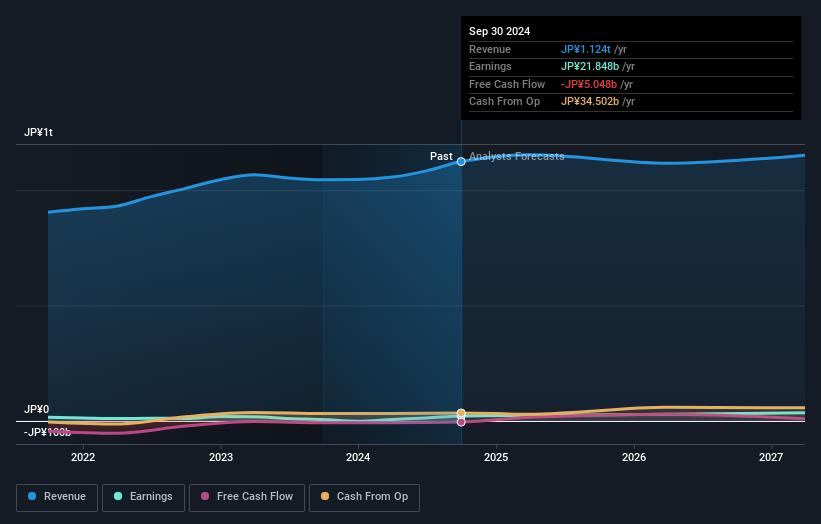- Japan
- /
- Electrical
- /
- TSE:5801
individual investors who own 50% along with institutions invested in Furukawa Electric Co., Ltd. (TSE:5801) saw increase in their holdings value last week

Key Insights
- The considerable ownership by individual investors in Furukawa Electric indicates that they collectively have a greater say in management and business strategy
- The top 25 shareholders own 48% of the company
- 48% of Furukawa Electric is held by Institutions
If you want to know who really controls Furukawa Electric Co., Ltd. (TSE:5801), then you'll have to look at the makeup of its share registry. We can see that individual investors own the lion's share in the company with 50% ownership. That is, the group stands to benefit the most if the stock rises (or lose the most if there is a downturn).
Individual investors gained the most after market cap touched JP¥497b last week, while institutions who own 48% also benefitted.
Let's delve deeper into each type of owner of Furukawa Electric, beginning with the chart below.
Check out our latest analysis for Furukawa Electric

What Does The Institutional Ownership Tell Us About Furukawa Electric?
Institutional investors commonly compare their own returns to the returns of a commonly followed index. So they generally do consider buying larger companies that are included in the relevant benchmark index.
As you can see, institutional investors have a fair amount of stake in Furukawa Electric. This can indicate that the company has a certain degree of credibility in the investment community. However, it is best to be wary of relying on the supposed validation that comes with institutional investors. They too, get it wrong sometimes. It is not uncommon to see a big share price drop if two large institutional investors try to sell out of a stock at the same time. So it is worth checking the past earnings trajectory of Furukawa Electric, (below). Of course, keep in mind that there are other factors to consider, too.

Furukawa Electric is not owned by hedge funds. Nomura Asset Management Co., Ltd. is currently the company's largest shareholder with 7.1% of shares outstanding. The second and third largest shareholders are Eastspring Investments (Singapore) Limited and Sumitomo Mitsui Trust Asset Management Co., Ltd., with an equal amount of shares to their name at 3.9%.
A deeper look at our ownership data shows that the top 25 shareholders collectively hold less than half of the register, suggesting a large group of small holders where no single shareholder has a majority.
Researching institutional ownership is a good way to gauge and filter a stock's expected performance. The same can be achieved by studying analyst sentiments. There are plenty of analysts covering the stock, so it might be worth seeing what they are forecasting, too.
Insider Ownership Of Furukawa Electric
The definition of an insider can differ slightly between different countries, but members of the board of directors always count. The company management answer to the board and the latter should represent the interests of shareholders. Notably, sometimes top-level managers are on the board themselves.
Most consider insider ownership a positive because it can indicate the board is well aligned with other shareholders. However, on some occasions too much power is concentrated within this group.
Our information suggests that Furukawa Electric Co., Ltd. insiders own under 1% of the company. Keep in mind that it's a big company, and the insiders own JP¥683m worth of shares. The absolute value might be more important than the proportional share. Arguably, recent buying and selling is just as important to consider. You can click here to see if insiders have been buying or selling.
General Public Ownership
The general public, who are usually individual investors, hold a substantial 50% stake in Furukawa Electric, suggesting it is a fairly popular stock. With this amount of ownership, retail investors can collectively play a role in decisions that affect shareholder returns, such as dividend policies and the appointment of directors. They can also exercise the power to vote on acquisitions or mergers that may not improve profitability.
Next Steps:
I find it very interesting to look at who exactly owns a company. But to truly gain insight, we need to consider other information, too. Take risks for example - Furukawa Electric has 2 warning signs we think you should be aware of.
If you would prefer discover what analysts are predicting in terms of future growth, do not miss this free report on analyst forecasts.
NB: Figures in this article are calculated using data from the last twelve months, which refer to the 12-month period ending on the last date of the month the financial statement is dated. This may not be consistent with full year annual report figures.
New: AI Stock Screener & Alerts
Our new AI Stock Screener scans the market every day to uncover opportunities.
• Dividend Powerhouses (3%+ Yield)
• Undervalued Small Caps with Insider Buying
• High growth Tech and AI Companies
Or build your own from over 50 metrics.
Have feedback on this article? Concerned about the content? Get in touch with us directly. Alternatively, email editorial-team (at) simplywallst.com.
This article by Simply Wall St is general in nature. We provide commentary based on historical data and analyst forecasts only using an unbiased methodology and our articles are not intended to be financial advice. It does not constitute a recommendation to buy or sell any stock, and does not take account of your objectives, or your financial situation. We aim to bring you long-term focused analysis driven by fundamental data. Note that our analysis may not factor in the latest price-sensitive company announcements or qualitative material. Simply Wall St has no position in any stocks mentioned.
About TSE:5801
Furukawa Electric
Manufactures and sells telecommunications, energy, automobile, electronic, and construction products worldwide.
Good value with mediocre balance sheet.


